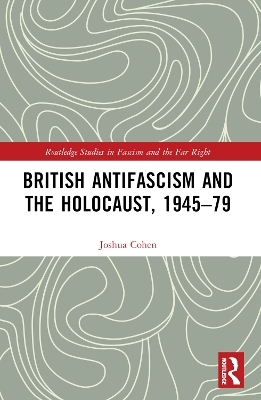
British Antifascism and the Holocaust, 1945–79
Seiten
2024
Routledge (Verlag)
978-1-032-07276-0 (ISBN)
Routledge (Verlag)
978-1-032-07276-0 (ISBN)
British Antifascism and the Holocaust, 1945–79 explores the extent to which the Holocaust has shaped British antifascism.
The author tests assertions of an uncomplicated relationship between Holocaust memory and the imperative to resist postwar fascist revivals. For those with a scholarly interest in how antifascists confront their opponents, it is essential to understand whether the Holocaust has always been seen as an insurmountable barrier against fascism: is the idea of the genocide’s constant antifascist ‘use’ actually a dangerous assumption and, if so, what are the implications of this for ‘Antifa’ as its battle with the contemporary far right unfolds? This book provides a political and structural history of the Holocaust’s relationship to antifascist organisations and questions whether networks of solidarity formed around Holocaust memory, including analysing the impact of the genocide in Jewish antifascists’ motivations and rhetoric. It also assesses the Holocaust’s political capital in wider antifascism and connected anti-racism, including in defence of the Black and Asian communities increasingly victimised by fascists over the postwar period.
This book will appeal to scholars and students with interests in antifascism, fascism, racism, and Jewish and left-wing history in Britain, and how these intersect with Holocaust consciousness.
The author tests assertions of an uncomplicated relationship between Holocaust memory and the imperative to resist postwar fascist revivals. For those with a scholarly interest in how antifascists confront their opponents, it is essential to understand whether the Holocaust has always been seen as an insurmountable barrier against fascism: is the idea of the genocide’s constant antifascist ‘use’ actually a dangerous assumption and, if so, what are the implications of this for ‘Antifa’ as its battle with the contemporary far right unfolds? This book provides a political and structural history of the Holocaust’s relationship to antifascist organisations and questions whether networks of solidarity formed around Holocaust memory, including analysing the impact of the genocide in Jewish antifascists’ motivations and rhetoric. It also assesses the Holocaust’s political capital in wider antifascism and connected anti-racism, including in defence of the Black and Asian communities increasingly victimised by fascists over the postwar period.
This book will appeal to scholars and students with interests in antifascism, fascism, racism, and Jewish and left-wing history in Britain, and how these intersect with Holocaust consciousness.
Joshua Cohen is Honorary Visiting Fellow at the Stanley Burton Centre for Holocaust and Genocide Studies at the University of Leicester, UK.
Introduction 1. ‘We got rid of the bastards’: The Holocaust and Anglo-Jewish Responses to Fascism, 1945–51 2. Never Forget? The Holocaust and Left-wing Antifascism, 1945–51 3. The Holocaust, Antifascism, Race and Immigration, 1951–60 4. ‘Somehow getting their own back on Hitler’: British Antifascism and the Holocaust, 1960–67 5. ‘This is what racialisation leads to!’: Using the Holocaust against the National Front, 1967–79 Conclusion
| Erscheinungsdatum | 05.10.2022 |
|---|---|
| Reihe/Serie | Routledge Studies in Fascism and the Far Right |
| Verlagsort | London |
| Sprache | englisch |
| Maße | 156 x 234 mm |
| Gewicht | 453 g |
| Themenwelt | Geisteswissenschaften ► Geschichte ► Regional- / Ländergeschichte |
| Sozialwissenschaften ► Politik / Verwaltung ► Politische Theorie | |
| ISBN-10 | 1-032-07276-8 / 1032072768 |
| ISBN-13 | 978-1-032-07276-0 / 9781032072760 |
| Zustand | Neuware |
| Haben Sie eine Frage zum Produkt? |
Mehr entdecken
aus dem Bereich
aus dem Bereich
Erinnerungen
Buch | Softcover (2024)
Pantheon (Verlag)
CHF 22,40
Universalgelehrter, Polarreisender, Entdecker
Buch | Hardcover (2024)
mareverlag
CHF 39,20


